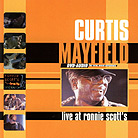May 2003
But don’t mistaken Live at Ronnie Scott’s as simply a Superbly retrospective. I was quite disappointed to find that despite Mayfield’s prolific career, only ten songs managed to make it onto this live set. Still every cut is a classic. Songs like "It’s Alright", "Freddie’s Dead" and "We’ve Gotta Have Peace" haven’t lost any of their edge or social significance. Buzzy Amato, Benny Scott, Luis Stefanell, Lee Goodness and Mayfield himself play each song with infectious rhythm and punch. There is little doubt this group of musician’s "feels" the music, and Mayfield’s husky, sweet vocals have lived through each lyric. It is easy to understand why this style is called soul. The 5.1 sound on Live at Ronnie Scott’s belies it’s late-'80s origins. Clear vocals coupled with great snap and articulation make it one of the best live recording’s I’ve ever experienced. The ambience of the venue and each instrument were reproduced precisely within the soundstage. This is not, however, a perfect recording -- Benny Scott’s bass does get overpowering at times and audio compression is apparent. But the feeling of being there, at Ronnie Scott’s, is intoxicating. Experienced in total darkness, this recording is pure magic. I also found this DVD-A to be a wonderful tool in evaluating audio components. Too lean a system would make the sound come off as threadbare and uninvolving, whereas a well-balanced system pulled the image together and gave each performer a distinct outline and weight. The extras on the DVD are nice additions and include a live video cut of "Freddie’s Dead" at Ronnie Scott’s as well as an interview with Mayfield. The interview was enjoyable, but a bit brief. British journalist Paul Weller’s questions’ speak directly to Curtis Mayfield’s history as a songwriter and performer as well as a his philosophy as a human being. Unlike with many interviews with musicians, Mayfield comes across as a peaceful soul whose ideas have grown out of wisdom and an understanding of people. When Mayfield talks about his desire to dig down below the surface and reveal the true emotional qualities of human beings, you get a sense that he understands the human condition and our need to feel connected to each other. After his accident, Mayfield was left a quadriplegic and died nine years later at the age of 57. For many, this may seem like a life that was cut short. But judging by Mayfield’s music and his philosophy, he experienced and accomplished more than many of us would hope to achieve in a lifetime. GO BACK TO: |
 Curtis Mayfield - Live
at Ronnie Scott's
Curtis Mayfield - Live
at Ronnie Scott's Curtis
Mayfield’s performance at a jazz club in England proved to be his last before an
accident at an outdoor concert paralyzed him from the neck down. A gospel singer at the
local church, Mayfield started his career at the ripe old age of 16. A singer and
songwriter, Mayfield created some of the most memorable funk-peppered soul of the '70s.
And although his talent supported over a decade and a half of energetic and memorable
music, his masterpiece is arguably the score to the film Superfly -- a story that
managed to touch upon the sensibilities of a young Mayfield growing up in the tough
streets of Chicago.
Curtis
Mayfield’s performance at a jazz club in England proved to be his last before an
accident at an outdoor concert paralyzed him from the neck down. A gospel singer at the
local church, Mayfield started his career at the ripe old age of 16. A singer and
songwriter, Mayfield created some of the most memorable funk-peppered soul of the '70s.
And although his talent supported over a decade and a half of energetic and memorable
music, his masterpiece is arguably the score to the film Superfly -- a story that
managed to touch upon the sensibilities of a young Mayfield growing up in the tough
streets of Chicago.